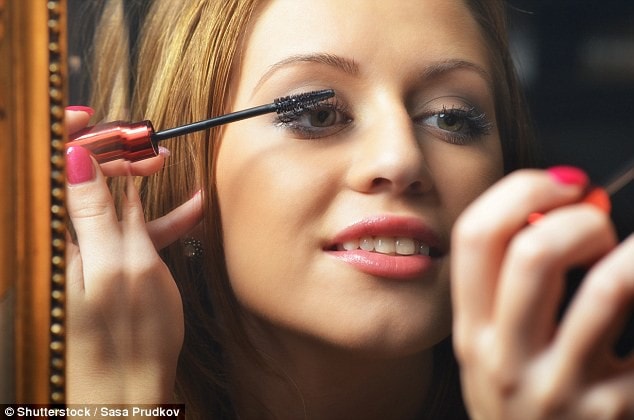8 daily habits that harm your eyes
Recent research has highlighted that healthy eyes are not a matter of luck, but that there are actually many things we can do to protect our vision and keep our eyes healthy.

Here are some everyday habits that can damage your eyes and what you can do to prevent them.
1. Swim every day
Swimming is extremely beneficial for the cardiovascular system, but without goggles, your eyes can hurt, especially if you wear contact lenses and open your eyes underwater because contact lenses can also become waterlogged, affecting your vision.
If you really must wear contact lenses while swimming, choose disposable lenses along with waterproof swimming goggles, or better yet, invest in a pair of goggles that allow you to see clearly without letting water come into direct contact with your eyes.
Water from lakes, rivers, and seas, or even showers, can cause eye infections.
2. Mascara is too "dated"
You know your mascara has gotten clumpy after 3-4 months of use, but don't want to buy a new one because it's too expensive?
Yes, it's time to ditch all that expired eye makeup from your makeup bag if you don't want to suffer from infections, red eyes, photophobia and irritation.

After four months, mascara starts to harbor dangerous bacteria. Good, unopened cosmetics can stay stable for several years.
Contact lens wearers are more susceptible to infection when applying eye makeup. Bacteria can be prevented by applying eyeliner carefully before each use.
Similarly, false eyelashes also pose a risk to the eyes. According to experts, false eyelashes are a hygiene risk because they tend to attract dirt and bacteria, while poor quality, unhygienic false eyelashes increase the risk, so it is important to find a reputable makeup artist.
3. Not getting an annual eye exam
Regular eye exams can help detect health problems such as diabetes, glaucoma and high blood pressure, all of which can lead to serious eye problems and even blindness if left unchecked.
Even arthritis can be detected by eye examination, as inflammation also occurs in the eyes and will eventually attack the eyes if left untreated.
Most ophthalmologists recommend eye exams every two years, unless you have eye problems or are over 70, in which case. Annual eye exams are best to catch any health problems early.
Children up to the age of 16 also need to have their eyes checked annually, as their vision can change very rapidly at this stage of life.
4. Glued to the phone
Always staring at your phone or computer screen or TV is never good for your eye health.
This is because these screens emit blue light which is absorbed by important cells in the retina of the eye, activating toxic chemicals that can eventually kill the light receptors needed for vision. And the older you get, the more vulnerable your eyes become.
Avoid looking at phones and tablets in the dark, as this can make your pupils more vulnerable.
Experts also recommend wearing glasses with anti-glare coatings that filter out blue light, or adding blue-light filters to your phone or computer.
5. Smoking
Everyone knows that smoking is bad for you, but few people realise that it also damages your eyes. Smoking increases your risk of cataracts and age-related macular degeneration (AMD), a common condition that affects the central part of your vision. In fact, AMD is the leading cause of blindness in the UK.
AMD occurs when the small central part of the retina, called the macula, degenerates and has been the leading cause of blindness for over 50 years.
The risk of AMD doubles if you smoke over the age of 50. So that's another reason to quit.

Although UV levels are generally higher on sunny days, it's important to remember that up to 80% of UV radiation can penetrate clouds, meaning forgetting to wear sunglasses on an overcast day can still damage your eyes.
So wearing sunglasses on a mild December morning is just as important as wearing them on a bright July afternoon.
7. Fan
Leaving a fan on overnight can increase irritation and dry eyes in contact lens wearers, as the fan blows allergens like dust or pollen into your eyes while you sleep, so when you put your contacts in in the morning, these trapped allergens are irritating and uncomfortable.
Solution? Dust bedroom surfaces, including fan blades, and keep a bottle of contact lens cleaner on hand to clean your glasses.
Set a timer on your fan so it turns off right after you fall asleep and wear a face shield while sleeping to protect your eyes.
8. Overuse of eye drops
Overuse of eye drops will cause the blood vessels in the eyes to dilate as the effect of the drops wears off, creating a vicious cycle: red eyes, more drops, redder eyes and more drops. Instead, we need to try to identify the cause and deal with it.
For example, if your eyes are dry due to cold weather and heating, invest in a humidifier and avoid sitting too close to the heater.
Stay hydrated by drinking plenty of water and eating foods rich in vitamins A, C, and E and omega-3 fats, like salmon. And wear sunglasses to protect your eyes from wind and cold.
How often eye drops can be used depends on the type.
Preservative-containing eye drops will have a longer shelf life. However, preservatives in eye drops are more irritating to the eyes. Eye experts recommend not using these eye drops more than four times a day. Preservative-free eye drops are best for people with sensitive eyes.







.jpg)
